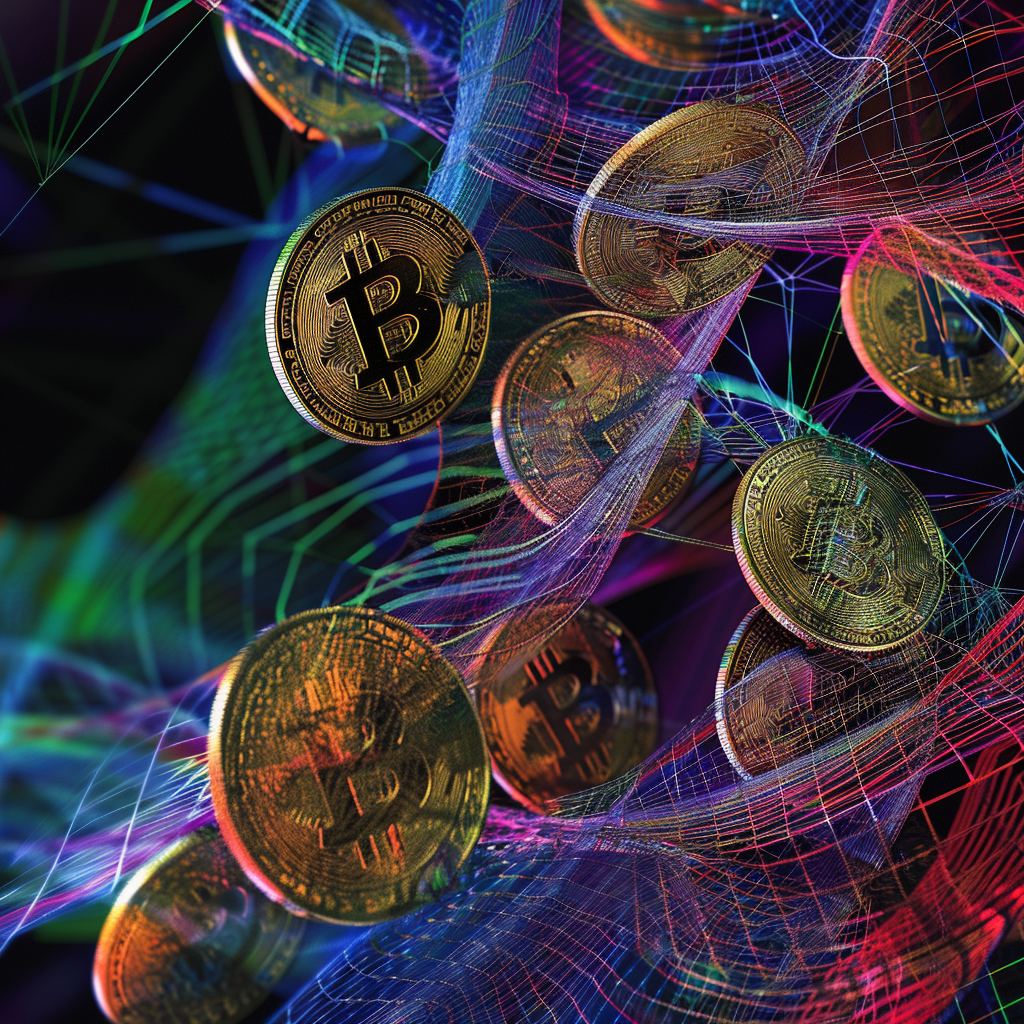
The above image was made by @amberjyang with Midjourney using the prompt 'coins caught in a geometrical symmetrical spiderweb colorful computer code background.'
Today I watched a new video from Whitney Webb about the effort by BlackRock and other major players to transform global financial markets. The big idea is that the United Nations Sustainable Development Goals in general and the UN's Agenda 2030 in particular are being used by the financial elite to create new mechanisms for privatizing public resources and exercising totalitarian control over human populations.
The basic problem involves a few components. In many countries, progress towards the Sustainable Development Goals will have to be financed by turning over national resources to international financiers. Carbon footprint calculations could be tied to a new identity scheme featuring increased mass surveillance and increased controls on our behavior. The introduction of Central Bank Digital Currencies could facilitate this increased behavioral control.
The video also presented the idea of asset tokenization in general as unambiguously bad. And it's true that emerging asset tokenization technology can be used to to make things like natural resources easier to track, trade, and leverage on financial markets, opening the door to a brand new class of power abuses. But I think an a priori rejection of tokenization would be throwing the baby out with the bathwater.
Right now, natural resources are owned. Land is owned. Tokenization of this ownership scheme wouldn't change who owned what. All it would change is how that ownership was tracked.
Tokenization can be empowering in ways we've barely begun to explore. Token trading markets give average people direct access to an otherwise inaccessible global economy. This economy is the only alternative to the legacy system. There are indeed interests like BlackRock lining up to exploit the emerging token economy for their own benefit. That doesn't mean tokenization is a bad idea. It means we need to take control of the emerging system for ourselves.
Webb's video suggests that now is a good time to download and archive web resources before they are censored or made unavailable by the powers that be. I agree that it's always a good idea to have critical information locally available. But here again, in the face of rampant censorship, I don't think the solution is to just give up on the web. The solution is to take control of the online world.
Overall, I agree that the powerful are using the Sustainable Development Goals to seize more power for themselves. I oppose CBDCs and question the carbon story. I'm sure BlackRock is positioning itself to be a crypto powerhouse. And the issue of digital identity is thorny at best under our corrupt control regime.
Acknowledging scale may make it easier to constructively respond to these things. A small group of people are guiding us into a future of their making, but there are far more of us than there of them. They have most of the money but we have all of the labor and our tech is just as good as theirs. If we don't like their future, we can chart our own course.
Read my novels:
- Small Gods of Time Travel is available as a web book on IPFS and as a 41 piece Tezos NFT collection on Objkt.
- The Paradise Anomaly is available in print via Blurb and for Kindle on Amazon.
- Psychic Avalanche is available in print via Blurb and for Kindle on Amazon.
- One Man Embassy is available in print via Blurb and for Kindle on Amazon.
- Flying Saucer Shenanigans is available in print via Blurb and for Kindle on Amazon.
- Rainbow Lullaby is available in print via Blurb and for Kindle on Amazon.
- The Ostermann Method is available in print via Blurb and for Kindle on Amazon.
- Blue Dragon Mississippi is available in print via Blurb and for Kindle on Amazon.
Read and subscribe to Free Mind Gazette on Substack
See my NFTs:
- Small Gods of Time Travel is a 41 piece Tezos NFT collection on Objkt that goes with my book by the same name.
- History and the Machine is a 20 piece Tezos NFT collection on Objkt based on my series of oil paintings of interesting people from history.
- Artifacts of Mind Control is a 15 piece Tezos NFT collection on Objkt based on declassified CIA documents from the MKULTRA program.
Sometimes tokenisation at times might not really go the way we want it
True enough. Yet it has its benefits too.
I was able to learn from this though but why does it usually look like tokenization is always the problem?
I think people who blame tokenization for the problem of common greed are missing the point.
I love this nuanced and balanced view of this issue! For someone who doesn't know much about crypto, your perspective is so helpful. Reading this post, it occurs to me that Whitney Webb often positions herself to be some sort of conspiracy fortune teller. Even though she unearths historical contexts, many of her interpretations of this information imply some sort of grim future of total elite control. I agree with you that her perspective (by itself) totally ignores real and empowering alternatives.
Hey thanks! I feel like Webb raises important considerations but doesn't always have a balanced view of their implications.